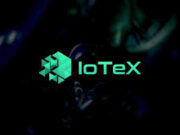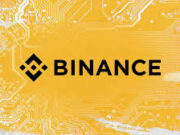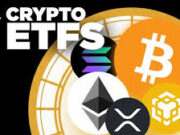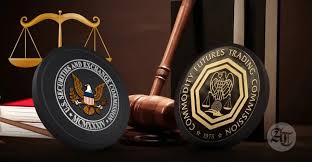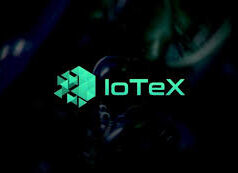The cryptocurrency landscape in the United States is on the verge of a seismic shift. On September 29, 2025, the Securities and Exchange Commission (SEC) and the Commodity Futures Trading Commission (CFTC) will hold a historic joint roundtable in Washington, D.C., to tackle the complex world of crypto derivatives, decentralized finance (DeFi), and prediction markets. This meeting isn’t just another bureaucratic gathering—it’s a bold step toward creating a unified regulatory framework that could redefine how digital assets operate in the U.S. For innovators, investors, and everyday crypto enthusiasts, this is a moment to watch closely.
Toward a Shared Rulebook
For years, the U.S. crypto industry has been caught in a tug-of-war between the SEC and CFTC, each claiming jurisdiction over different aspects of digital assets. The SEC treats many cryptocurrencies as securities, while the CFTC views others, like Bitcoin, as commodities. This overlap has created confusion, pushing innovation offshore to jurisdictions with clearer rules.
The September 29 roundtable signals a truce, with both agencies committing to work together to harmonize their approaches. As SEC Chairman Paul Atkins and CFTC Acting Chairman Caroline D. Pham put it, “The work of the SEC and CFTC has never been more intertwined—and the wave of innovation before us never more dependent on the depth of our cooperation” (SEC, 2025).
This collaboration builds on a joint staff statement from earlier in September 2025 clarifying that registered exchanges can trade certain spot crypto assets without legal barriers (SEC Press Release, 2025). The objective is clear: create a playbook that fosters innovation while protecting investors, and bring products like perpetual contracts and DeFi protocols into the U.S. market under clear, unified rules (The Block, 2025).
Perpetual Contracts Enter the Spotlight
One of the most closely watched topics on the agenda is perpetual contracts—derivatives without an expiration date that dominate offshore crypto markets. These instruments let traders speculate on price movements with leverage, offering both opportunity and risk.
So far, U.S. jurisdictional conflicts have kept them off domestic platforms, forcing traders toward unregulated offshore exchanges. Now, the SEC and CFTC are evaluating ways to “onshore” these contracts while maintaining investor protections (CFTC Statement, 2025).
If approved, perpetual contracts could shrink the liquidity gap between U.S. and offshore venues, improve price discovery, and give both institutional and retail traders access to safer, regulated tools. Analysts note that this could redirect billions in trading volume back to the U.S. (CryptoBriefing, 2025).
DeFi’s Regulatory Breathing Room
Decentralized finance (DeFi) is also at the forefront of discussions. These blockchain-based protocols enable peer-to-peer trading without intermediaries but exist in a regulatory gray zone. To bridge this, the agencies are considering “innovation exemptions” or safe harbors, which would give DeFi platforms the ability to experiment with spot, leveraged, or margined products while long-term frameworks are developed (Mitrade, 2025).
What’s especially notable is that regulators are embracing principles of self-custody—long a core tenet of DeFi—as aligning with “core American values.” This marks a sharp contrast from earlier enforcement-heavy approaches, signaling regulators’ willingness to balance decentralization with investor protections (AInvest, 2025).
Betting on Outcomes: The Future of Prediction Markets
Another major item on the agenda is prediction markets, where users can speculate on real-world events like elections, interest rate moves, or even sports outcomes. Historically, these markets have been stifled by overlapping securities and futures laws.
The SEC and CFTC now appear ready to consider frameworks that would let such contracts flourish in the U.S. If successful, this could introduce a new regulated asset class and provide investors with innovative ways to hedge against—or capitalize on—real-world events (MarketsMedia, 2025).
The potential is vast: imagine betting on the 2028 presidential election or the next Fed rate hike, all on a U.S.-regulated platform (BitcoinWorld, 2025).
Building the Infrastructure for Regulation
Beyond specific products, the roundtable will address foundational issues: aligning product definitions, improving data reporting, harmonizing capital and margin requirements, and even implementing portfolio margining to reduce inefficiencies. Some estimates suggest this could cut institutional trading costs by as much as 40% (BitcoinEthereumNews, 2025).
This builds on initiatives like the SEC’s Project Crypto and the CFTC’s Crypto Sprint, both designed to modernize U.S. regulation in light of rapid innovation (SEC, 2025).
Walking the Tightrope: Innovation vs. Investor Protection
Balancing innovation with protection remains the central challenge. Regulators must safeguard investors against fraud and manipulation without smothering the industry’s innovative potential. By allowing spot trading on regulated exchanges and providing breathing room for DeFi projects, they’re signaling a shift toward pragmatic solutions (MEXC News, 2025).
The stakes couldn’t be higher. Regulatory clarity could attract billions in institutional capital, restore the U.S.’s competitive edge, and anchor innovation onshore. But overly rigid rules risk driving talent and capital to friendlier jurisdictions like Singapore or Dubai (AInvest, 2025).
Why Investors and Builders Should Care
For investors, the emerging framework promises access to safer perpetual contracts, clearer derivatives rules, and new asset classes like prediction markets. Institutional players, in particular, stand to benefit from harmonized rules and portfolio margining.
For innovators, the roundtable offers something equally valuable: regulatory predictability. With safe harbors and open channels for industry input, U.S. crypto startups could finally operate with clarity and confidence (SEC Press Release, 2025).
A Turning Point for U.S. Crypto
The SEC-CFTC joint roundtable on September 29, 2025, represents more than just a policy meeting—it’s a defining moment for the future of crypto in the United States. From perpetual contracts to DeFi to prediction markets, the issues on the table will shape financial markets for years to come.
As CFTC Acting Chairman Pham remarked, “The next chapter of financial innovation is written right here in America” (CFTC, 2025). Whether the U.S. becomes the global hub for blockchain innovation—or cedes ground to international competitors—depends in large part on the decisions made in Washington this fall.
Sources
- SEC Joint Statement with CFTC on Cooperation (2025)
- SEC and CFTC Staff Issue Joint Statement on Spot Crypto Assets (2025)
- The Block – SEC & CFTC New Joint Guidance (2025)
- CFTC Statement on Harmonization (2025)
- CryptoBriefing – Perpetual Contracts Regulation (2025)
- Mitrade – SEC and CFTC Launch Joint Effort (2025)
- AInvest – Navigating SEC-CFTC Regulatory Shift (2025)
- MarketsMedia – SEC, CFTC Set Out Priorities for Harmonization (2025)
- BitcoinWorld – Crypto Regulation Crucial Meeting (2025)
- BitcoinEthereumNews – SEC and CFTC Roundtable (2025)
- SEC – Project Crypto Statement (2025)
- MEXC – SEC and CFTC Joint Roundtable Coverage (2025)
- CFTC Official Page (2025)


